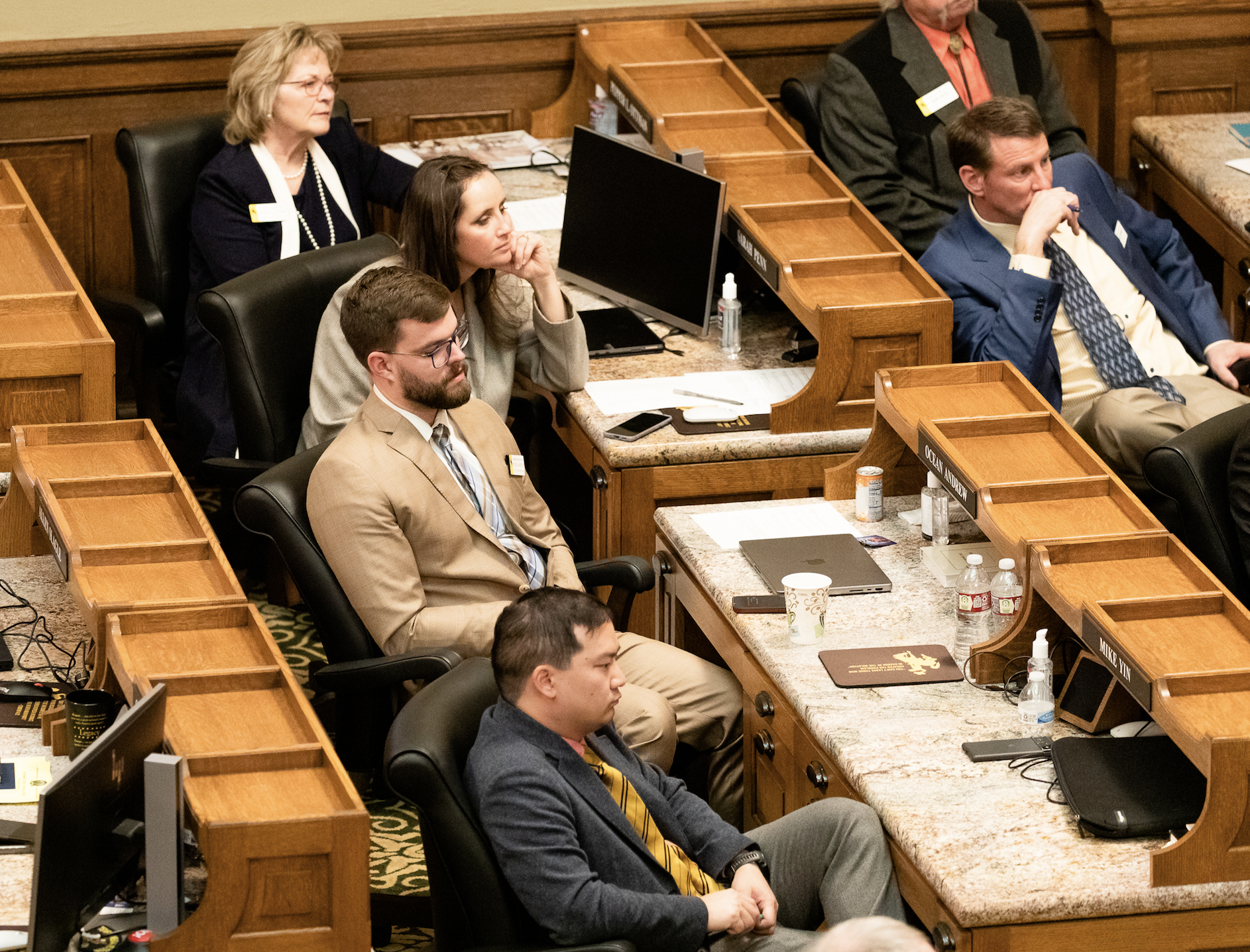
• Abnormally high number of bills perished after failing to meet deadlines, leaving lawmakers divided on what that says about the House and its leadership.
By Maggie Mullen, WyoFile.com
CHEYENNE—Monday was an exceptionally deadly day for bills in the Wyoming Legislature.
The fifth week of the general session traditionally presents a daunting gauntlet to aspiring laws and dozens of bills typically die as they fail to navigate critical milestones by chamber deadlines. This year, however, a record number of bills in the House met their end for lack of an initial floor vote by the deadline. Lawmakers are divided on what that says about the body and its leadership.
After a bill clears introduction and committee hurdles, when or if it gets debated on the floor is up to the majority floor leader, the second ranking officer in the body. In the House, that’s Rep. Chip Neiman (R-Hulett). It’s his prerogative to move legislation to the front or back of the line of bills waiting to be debated. That gives him a lot of power to decide which bills live and which wither on the vine.
“It is a weighty challenge,” said Neiman, whose Republican colleagues elected him to the leadership position in a 29-28 vote in just his second term in the Legislature. Neiman said Wednesday he had anticipated shepherding more bills past that initial deadline, but didn’t make much ado about, or express dissatisfaction over the volume of dead bills.
Giving everybody what they want, Neiman said, will win you a popularity contest — “everyone waves at you, and you’re always liked and when you meet people in the hall, everybody’s glad to see you” — but that’s not “good leadership.” Instead, Neiman sees his position as an important backstop for the body, since there can be “a lot more to [a bill] than what meets the eye.” he said.
“It’s just a lot of responsibility,” he said. With almost half of the House new to the process, the learning curve has been steep for many. Neiman admits that the “youth” of the body may be slowing down the process.
That concerns Rep. Steve Harshman (R-Casper), the longest serving member of the current House and the only two-term House speaker in Wyoming history. The tangible effect of “inexperience” in both leadership and the body is that existing problems don’t get solved for the people of Wyoming, he said.
“We’re [working] extremely slow,” said Harshman, who had seven of his own 10 sponsored bills die on Monday without a debate or vote on the floor. “We’re working fewer hours and we’re talking little, simple bills to death.
“There were some little bills that could solve some problems that are gonna have to wait now,” Harshman said.
Similar to Neiman, House Speaker Rep. Albert Sommers (R-Pinedale) has the ability to kill bills, but he’s taken a more restrained approach, halting 25 bills from introduction. For comparison, that number was 53 during the last general session. Sommers knows the tough choices Neiman is facing because he served as majority floor leader last session and has been deferential to his successor’s way of doing business.
The House’s slower pace and higher bill mortality rate has created an unusual opportunity for the opposite chamber. With fewer crossover bills to work, Senate President Ogden Driskill (R-Devils Tower) said his chamber is discussing taking additional days off around the upcoming Presidents’ Day holiday.
Some 45 House bills died without an initial vote on Monday, which is higher than any other general session in the last 20 years, according to a WyoFile analysis of Legislative Service Office data. An average of 19 general session bills succumbed to that deadline since 2003.
This year, six of the record 45 were committee bills. That type of legislation gets extra attention and deliberation by lawmakers, state agencies and other stakeholders outside the session — a vetting that typically translates into priority during the session relative to individually sponsored bills
“I’ve never seen before so many committee bills not be heard,” said Rep. Dan Zwonitzer (R-Cheyenne), who’s served since 2005.
“Every now and then, there’s an issue with a committee bill and it gets held back, so nobody expects all of them [to get through],” Zwonitzer said. It was disappointing to see so many committee bills, which take additional time and resources, make it to the House “just to sit there,” he said.
Depending on the complexity of a bill, it can cost between $6,800 and $14,350 to propose, draft and enact, according to a Legislative Service Office memo. The cost of a bill can exponentially increase if it requires lawmakers to consider it at one or more interim committee meetings. Prioritizing committee bills might make sense in theory, Neiman said, but harder to do in practice “when you look at the sheer volume of bills” that are proposed.
One committee bill to die without floor discussion was Medicaid expansion, which advocates said would provide medical coverage for 19,000 uninsured Wyoming residents. After House Bill 80 – Medical treatment opportunity act-Medicaid reform passed through the Revenue Committee, Neiman kept it far from the top of the general file. It ultimately died when it didn’t receive a first vote on the floor by deadline. Like his fellow Wyoming Freedom Caucus colleagues, Neiman said he opposed the bill due to its reliance on federal dollars.
There can be value in giving the body an opportunity to debate a bill even when he personally opposes it, Neiman said. For him, making that determination requires contemplation and divine consultation.
“You just have to pray,” Neiman said. “And try to gather as much information as you can. And be as thoughtful as you can and [not] make a rash decision.”
“I voted against a lot of bills I brought out,” Neiman said. These included House Bill 4 – Medicaid twelve month postpartum coverage, which would extend coverage after giving birth from the current two months to 12 months. The bill passed third reading on Wednesday and is now headed to the Senate.
Earlier this session, lawmakers bolstered Neiman’s power to single-handedly kill a bill when they adopted a new rule to weaken the body’s ability to override either the majority floor leader or the House speaker. Either maneuver now requires a two-thirds vote instead of a simple majority.
House Minority Floor Leader Rep. Mike Yin (D-Jackson) was one of approximately 26 lawmakers to oppose the new rule, because, he said, it delegates “our power as the body away from ourselves to those in leadership positions.”
No one attempted to use the new rule to challenge Neiman and change the order of bills, which Yin said is evidence that “what power the body has to decide what it does and does not hear” has diminished.
There were several bills that Yin was sorry to see go unheard, including Medicaid expansion, an incentive program for improving neglected or abandoned commercial buildings as well as proposal for a film production rebates program. All had bi-partisan support.
“When C.J. Box has told us […] this is how much money and economic development that we missed out on, that’s the kind of thing that, it’s disappointing that we weren’t able to hear,” Yin said. The New York Times bestselling author’s books based in Wyoming have been turned into a television series made in other states.
Meanwhile, the body spent considerable time on “controversial bills,” Yin said. Without pointing to specific examples, Yin said “many of the culture war bills tend to fit that category” as well as “anything that took more than 75 minutes in the committee of the whole.”
House Bill 152 – Life is a Human Right Act which would prevent abortion in cases of incest or rape, among other things, was one such bill that ate up considerable time. The debate lasted nearly two hours and wasn’t so much about if the Legislature should restrict abortion, but what would hold up better in court — the proposed bill or the current trigger ban.
Neiman said that what he saw as some of the “bigger issues” took longer to debate, but he stood by the bills he chose to prioritize, which included at least one bill from each lawmaker.
Harshman sees things differently, especially when he considers the collection of bills that went unheard on Monday. There wasn’t an even balance between the number of bills from Freedom Caucus members that died without debate compared to bills belonging to other members that met the same fate, Harshman said.
For instance, of the known members of the Freedom Caucus — the group does not disclose its entire membership — only Rep. Rachel Rodriguez-Williams (R-Cody) had a bill go unheard on Monday. Meanwhile, several establishment Republicans and Democrats had multiple bills meet that fate, including Yin, Harshman and Zwonitzer.
Neiman rejected Harshman’s assessment. “If we look back across the entire scope of bills, I would dare say that it was very balanced,” Neiman said.
House bills that passed third reading now head to the Senate for consideration.





